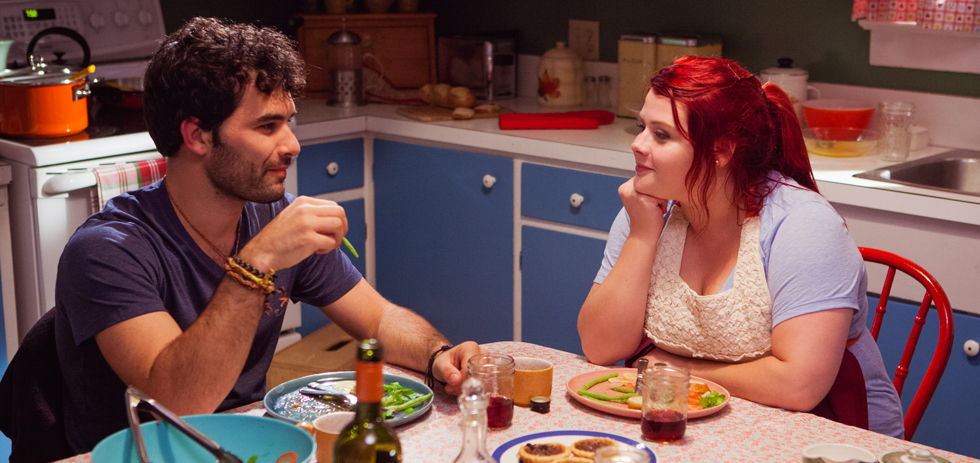
There have been few representational trends in mainstream filmmaking in the last few decades as welcome, and timely, as the emergence of a new kind of millennial comic woman. Evolving from the Nineties’ acerbic backlash-against-the-backlash comediennes – Ellen deGeneres, Roseanne Barr et al. – recent years have seen several films and TV shows feature women whose transgressiveness is framed within astute characterisation, and smart dissections of the absurdity of everyday gender roleplay. The new funny woman, without fail, embodies traditionally vulgar or unacceptable traits; she’s fat (Rebel Wilson, Melissa McCarthy), masculine (Jane Lynch), detached and disinterested (Kristen Wiig, Aubrey Plaza), or, most scarily of all, literate and serious-minded (Lena Dunham). The main achievement of Relative Happiness, an independent Canadian comedy-drama and sophomore feature for director Deanna Foley, is that it potentially adds another name to this list – and a surprising one at that, in the form of Adelaide actress Melissa Bergland, previously best known for her turn in the turgid Seven Network soap Winners & Losers. Bergland plays Lexie Ivy, a young(-ish), smart(-ish), confident(-ish) woman running a bed and breakfast in rural Nova Scotia, forced to deal with undercurrents of familial and personal discontentment while her sister Gabby plans a wedding, and she becomes entangled with her latest lodger. Bergland’s inherent likeability – and balance between sickly-sweet and crass cynicism – provide the film’s best moments, puncturing the picaresque charm of small-town Maritime life with a much-needed genre awareness that keep it from feeling twee.
Regrettably, its lead actress’ undeniable talent isn’t enough to rescue Relative Happiness, whose remainder ranges from stultifying and predictable to hilariously inept. Bergland’s Lexie soon comes across as a character that’s somehow, perhaps as a result of a Hollywood clerical error, stumbled in from a film which had an actual, functioning plot. Various other characters, from Lexie’s extended family of sisters, in-laws, and parents to the perplexingly hostile roofer working on her property and her self-destructive best friend, flitter in and out of scenes with the same level of nuance and development as an office April Fool’s joke. For example, take Lexie’s unnamed father (David Christoffel), who makes exactly four appearances in the film. The first two are in scenes which establish his avuncular, friendly nature – an intervening scene includes Lexie calling him “a doll”, a weird term to use for your father, but whatever; he is clearly the moral centre of his adoring family. His third scene takes place after Lexie discovers her new customer Adrian (Johnathan Sousa) in bed with her soon-to-be-wed sister, and involves her father drily advising her to forget about everything and remain best friends with her vapid sibling. His fourth and final appearance takes the non-sequitur cake, though, as Dad’s last narrative contribution is to die, at what looks like about fifty-five, of an unspecified illness which is never mentioned again.
The whole film is full of inexplicable narrative ‘developments’ like this, which seem calculated to pad out the community and family in which Lexie lives, but are so ill-judged that they’re distracting in their oddness. Further narrative lowlights include a camping trip Lexie takes with her friend Susie and Susie’s ex-con boyfriend Ernie – the fact that he once went to prison is mentioned twice, and bears zero relevance to the plot – on which Lexie fails to bring a tent or warm clothes; in Nova Scotia, in the winter. Why an apparently successful businesswoman would be so mind-numbingly dumb is not approached, other than a vague suggestion that Lexie’s family are wealthy enough for her to be somewhat clueless. Without an effective depiction of its lead character’s environment, though, the film leaves us neither surprised nor satisfied by her decisions – there simply isn’t enough to go on to allow Bergland to make Lexie an interesting character. The dialogue itself, too, suffers from a few dud lines derailing important scenes, which the rest of the cast are nowhere near as capable at deflecting as Bergland is. When Gabby (Molly Dunsworth) disappears after her engagement breakdown, father’s death, and sibling animosity become overwhelming, her new beau – none other than Adrian – is obviously distraught. Pressed on what happened, he tells the gathered family that “he just went out to get some mineral water” and Gabby was gone. Who, in this situation, would let everyone know that they were after ‘mineral’ water specifically? And who heads out late at night expressly to buy it? Use the tap! Sousa’s awkward delivery of these ‘serious’ lines only brings more attention to the unnatural dialogue, and all of the tension of what should be a climactic scene is dissipated.
The narrative does have the basic temerity to veer away from the initial ‘get-a-date-for-the-wedding’ plot, and to move in the unexpected direction of ending Lexie and Adrian’s relationship before it begins, both welcome developments in a film so clearly meant to act as a vehicle for a more realistic female rom-com archetype. There are, too, some beautiful shots of the rugged Nova Scotia scenery, which are effective in establishing the cosy, parochial nature of the community. In the end, however, it’s Relative Happiness’ insistence on appearing as a family ensemble rom-com which ruins it. The script isn’t up to scratch, and the cast are almost uniformly average, making almost any exchange not involving Lexie wholly uninteresting. Funnily enough, two cast members from the uproarious white-trash comedy Trailer Park Boys have small roles, including a welcome and hilarious cameo from Robb Wells. With Melissa Bergland’s Aussie acerbity and knack for physical comedy already apparent, perhaps that the best thing that could have happened in Relative Happiness would have been for the rest of the TPB boys to appear and inject some life into this Canuck clunker.
